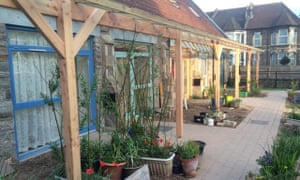East Devon Local Plan - 2013 to 2031
Futures Forum: The District Council, developing Mill Street in Sidmouth ... and transparency
It could also demand that developers come clean with their viability assessments:
Futures Forum: Sidford and affordable housing > of 'viablity' and 'overage'
However, it will do neither:
Futures Forum: Knowle relocation project: and "sheer hypocrisy" >>> District Council planning officers reject the Green Close development over affordable housing and overage
Futures Forum: Knowle relocation project: new FOI request for PegasusLife viability report
Particularly because they're up against much more experienced players:
Futures Forum: How viability assessments allow developers to break promises made to get planning permission and cut the number of affordable houses by half
Futures Forum: A solution to our housing problems: scrap viability assessments
And yet in Bristol this happens, as reported in the East Devon Watch blog and by the Guardian:
“HOW BRISTOL IS STANDING UP TO DEVELOPERS”
7 MAR 2018
East Devon developers do not disclose their viability agreements – EDDC thinks they should remain confidential because they contain “commercially sensitive information” yet Bristol disagrees and publishes theirs.
Baker Estates in Honiton have been allowed to reduce the number of affordable properties, using such a confidential document.
“How Bristol is standing up to developers” | East Devon Watch
23 February 2018 - Developer requests reduced affordable housing provision on residential development at Hayne Lane, Honiton - East Devon
Developers want to reduce affordable housing at new Honiton 300-home development - Devon Live
23 February 2018 - Developer requests reduced affordable housing provision on residential development at Hayne Lane, Honiton - East Devon
Developers want to reduce affordable housing at new Honiton 300-home development - Devon Live
'We said it wasn't acceptable': how Bristol is standing up to developers
With little social housing and a property price explosion, campaigners and councillors are taking back control
Last autumn, campaigners scored an unprecedented victory. The target was “viability assessments”: dossiers produced by housing developers to justify the amount of affordable housing – or lack thereof – in their developments, and which are frequently used during the construction process to shrug off previous commitments.
“Developers were saying, ‘We can’t afford to put 30-40% affordable housing in here,’ to make the profits they are legally entitled to,” says Louie Herbert, spokesperson for Bristol-born tenants union Acorn. “But all of their numbers – how much they projected to sell the houses for, how much they bought the land for – were redacted.”
Acorn, along with the Bristol Cable media co-operative, campaigned for the full release of these files. Following a public outcry, the council voted to make the viability assessments public.
Now, Herbert says, the public can examine these assessments themselves, and make sure that more affordable housing is built in their areas.
For now, it’s too soon to tell if publishing the viability assessments has achieved change in Bristol. But it’s a small step that could point the way for cities such as London, where viability assessments remain pervasive, or Manchester, where in contravention of the city’s own guidelines, none of the nearly 15,000 planned new developments have any provision for affordable housing.
Bristol’s mayor, Marvin Rees, believes that it sends a signal to developers: “We’re a great city to do business in – but we want the right kind of money.”
Councillor Paul Smith agrees. “Housing can’t be left to the market if you want to meet the housing needs of the whole city,” he says. “There are 500 families in temporary accommodation, 100 people sleeping rough on the streets, huge numbers who are inadequately housed, and people living in poor-quality, high-rent accommodation.”
With the exception of a few developers, he says, “the market doesn’t want to deliver affordable housing” to address these problems. An “incredibly weak” planning system is exacerbating matters.
So, rather than sell off council land to the highest bidder, Bristol now holds on to it. “We’re a big landowner in Bristol and it’s the strongest power we’ve got,” says Smith.
Instead, the council is focusing on developing that land. It is working with housing associations and community partners, it has set up a housing company so it can borrow money to build homes, and it is helping housing associations to buy up land and private housing.
“We’re only going to work with [developers] who are interested in meeting our objectives,” says Smith. “If you come to us with a record of using ‘viability assessments’, ‘permitted development’ rules (which allow offices to be converted into housing, again without any requirement for affordable units) and other mechanisms to avoid delivering affordable housing on privately owned land, don’t expect to partner with us on land that we own.”
One win was the former Blackberry Hill Hospital site, a new housing development that is being built on land owned by the Homes and Communities Agency (HCA). Developer Galliford Try’s initial proposals included no affordable homes. Acorn, the council, the mayor and local MPs resisted.
“We said that it wasn’t acceptable,” says Smith. Galliford Try came back with 20 affordable homes; the HCA, the council and Sovereign Housing Association together have facilitated 80 more. Of the 360 homes, 100 will now be affordable.
Another approach is community-led housing. Martin Horne, 40, an architect, lives with his wife and two children in a three-bedroom terraced house at Fishponds, developed by BCLT. The 12 homes are a mix of shared-ownership and affordable rent, and Horne says he was also attracted by the ability to self-finish the houses, and the sense of community. Plus, of course, the price. “We were paying £825 a month in rent and now our costs are closer to £700,” he says.
BCLT is working on building 49 more affordable homes at a second site in Lockleaze – a £9m project in partnership with a housing association, United Communities. “It’s a small village in the middle of the city,” says Cowling, though he acknowledges that community land trusts can be difficult to see through.
Rees pledged in the 2016 election to build 2,000 new homes a year by 2020, including 800 affordable ones, and still insists that promise can be kept – but only if local authorities, government and businesses take collective responsibility. Otherwise, “the heart will be taken out of the city – and that will cost us.”
- Are you affected by the housing affordability crisis discussed in this piece? Let us know in the comments
Follow Guardian Cities on Twitter, Facebook and Instagram to join the discussion, and explore our archive here
'We said it wasn't acceptable': how Bristol is standing up to developers | Cities | The Guardian
.
.
.



No comments:
Post a Comment